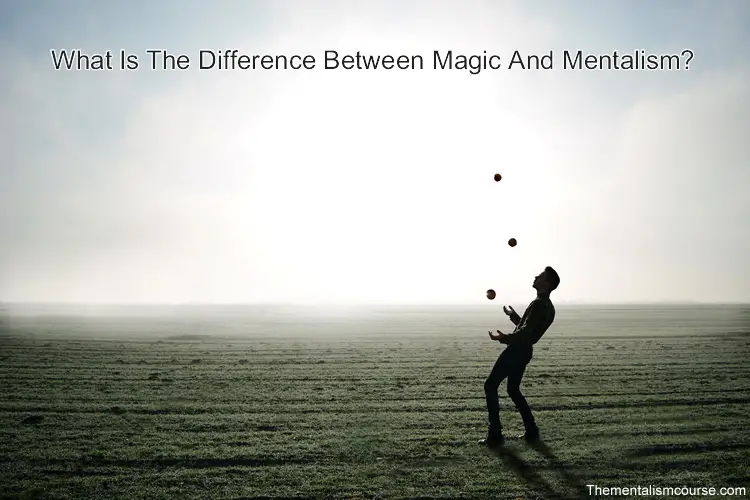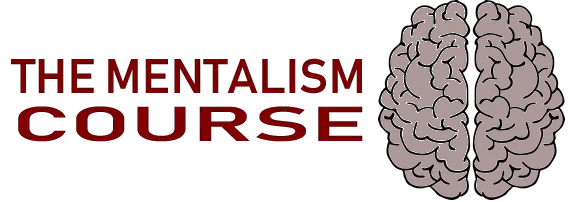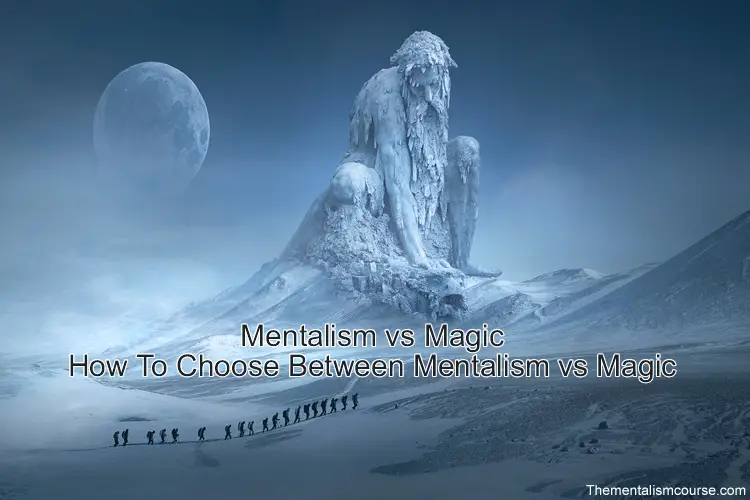Mentalism vs magic what are the similarities vs the differences between these two skills
You may be at the point of choosing between mentalism vs magic to learn and master. Do you want to be a mentalist or do you want to be a magician? Or both?
[divider style=”9″]
The main difference between mentalism and magic is that mentalists tend not to use props during a performances. whereas magicians generally need props to perform their magic. Mentalists focus on the mind and psychology whilst magicians focus on slight of hand and making objects appear and disappear. They both play with your mind, but a mentalist will get inside your head, whilst a magician confuses your brain by creating impossible illusions.
[divider style=”2″]
What is the difference between magic and mentalism?

Mentalism vs magic are different, but what is the difference between magic and mentalism?
The main characteristics of mentalism
Mentalism tends to be more about psychology and the mind.
The art of Mentalism is about connecting with people through the understanding of body language. Mentalism is about being sensitive to those micro expressions that everyone uses naturally.
But to become a mentalist it’s about honing this built-in ability until its a mastered skill.
Always bear in mind that all humans have the ability to read body language. You do it every time you converse with someone. You ‘speak in body language‘ and you ‘listen in body language‘. In fact around 80% of communication is through body language and it’s done naturally and subconsciously.
However, learning the skill of fully understand and reading a person’s body language is what sets a great mentalist apart from the average person or an amateur mentalist.
Mentalism is also about the ability to influence others by using body language or ‘micro-influences‘. For an example of this in action, you’ll see this in my article mentalist Lior Suchard bends Harry Connick Jr.’s mind.
Mentalism is about creating the illusion of mind reading or predicting the future.
One of my favourite mentalism techniques is guessing numbers. You can also see this mentalism skill in action in the above article by Lior Suchard.
More Reading: How much is Lior Suchard worth? (Mentalist Lior Suchard net worth)
What’s the difference with magic over mentalism
Magic on the other hand is about using sleight of hand and trickery. Magic is about using misdirection and is about deception and fooling people.
Sleight of hand, which is also known as prestidigitation or legerdemain, is mostly used by magicians to beat the mind.
When I say ‘beat the mind‘, it’s not like mentalism which relies on psychology, it’s about the ability to beat the ‘eye-to-mind‘ link.
Sleight of hand relies on the human brain’s ability to be distracted. People are only able to assimilate certain information.
This means that magicians have the ability to distract their audience from what’s actually happening. This is what makes it appear like magic.
Magicians use sleight of hand in close-up magic with card tricks and the like.
But magic is also about making objects disappear or appear, like the famous rabbit out of the hat trick.
Good magic tricks also include objects (or people for that matter) reappearing where the audience least expects them to reappear.
Magic can also be about creating elaborate illusions, like sawing people in half.
We all know it’s actually impossible for someone to be sawed in half, but people are usually spell-bound and left wondering how the tick has been done. It’s what makes magic entertaining.
The realism of magic vs mentalism
We know magic isn’t real, but we enjoy the entertainment value it brings. Most love the fantasy value that magic brings, which is no different to watching a movie like Mary Poppins.
But the reality is there are very few people in the world who genuinely believe that magic is actually real.
The difference in this regard to mentalism is there are many more people who actually believe mind-reading is possible, or that people actually possess psychic powers.
There’s a whole industry of psychic mediums, where people believe this is real. In reality a psychic medium is adopting the same techniques as a mentalist does. So psychics are mentalists.
Difference in outcome and perception between mentalist vs magicians
The perception of a mentalist
When a mentalists performs there’s more of an emphasis on the personal interaction between the mentalist and their audience.
The aim for a mentalist is to convince the audience that no trickery was used.
Mentalists want their audience to believe in the possibility that they really do have mind-reading or supernatural powers.
Even if this is not the case, and where audience members don’t believe in the supernatural or mind-reading, at the very least the intention is to leave the audience astounded. But also to leave them with no explanation as to how it was done.
The perception of a magician
With a magician the object of the performance is to leave the audience guessing how the trick or illusion was done.
A magician’s objective is to have the audience wonder how they could have missed the sleight of hand or the misdirection in the trick. The audience know it’s not ‘true magic‘.
The purpose of a good stage magician is to leave the audience wondering ‘how did they do the trick or illusion?’ They are usually not left wondering, ‘is it real magic ‘.
That is unless the audience is a young audience who are seeing magic for their very first time. But even kids are extremely perceptive and many times can’t be fooled by magicians either.
Mentalism vs Magic – What are the similarities
There are a number of similarities between mentalism and magic, let’s take a look at a few of these.
The skills required for mentalism and magic require time to learn and develop
One of the similarities between mentalism vs magic is how both require the learning of new techniques or the honing of existing skills.
Any new skill takes time to learn, but more importantly, it take more time to master.
For example, with magic it’s could be about learning the art of sleight of hand or the skill of using your hands and manipulating playing cards.
Whereas with mentalism it’s about learning a number of psychological skills. Mentalism is about developing the mind and being more aware.
You already have many of the skills needed for mentalism, but you need to hone them. For example, you can already read body language.
Humans, as do all animals, use body language to communicate. As a mentalist you need to develop this skill to read body language better than the average person.
Mentalists need to be able to better read, understand and interpret body language and what it means.
Mentalism and magic both require confidence to perform
To become a mentalist or a magician requires confidence. You need to have the confidence to perform in front of an audience. If you are afraid of public speaking, then you may need to overcome this fear in order to become either a magician or a mentalist.
Of course practice and being good at your tricks will give you that confidence. Performing your mentalism tricks or magic tricks in front of an audience will build confidence too.
But you may need some help with your confidence. The Quantum Confidence system may be what you need. Please click the link below to find out more.
Mentalism and magic both involve trickery
Whether you want to learn magic or mentalism, they both involve trickery. Whilst they both involve tricking the mind, the way in which these two skills trick the mind is different.
With magic it’s about misdirection trickery and fooling the minds of your audience so they are directed away from seeing what actually happens.
Whereas with mentalism, the trickery involves psychology. Mentalism trickery involves playing with peoples minds at a psychological level. This could be the use of embedded suggestion or by interpreting a person’s body language to create the illusion of mind reading.
Audiences will be fooled during a good performance of magic and mentalism
Whether you have chosen to perform magic or mentalism, or indeed both, you will be out to ‘fool your audience‘.
If you do a good job, if you master your skills and if you perfect your tricks, you will amaze your audience, no matter how large or small they are.
You aim with magic or mentalism is to fool the likes of Penn and Teller in ‘Fools Us‘.
Comedy helps with both magic and mentalism
There’s no doubting that comedy helps with any performance. This is true for both mentalism and magic too.
Many magic performers, as well as mentalist performers, use comedy to help move their performances along. With most magic and mentalism tricks there’s always a build-up, it sometimes takes time to ‘set the scene’.
During this scene setting time, the audience need to be entertained. Comedy is the solution and usually works very well.
Mentalism vs magic – the rivalry
Some might argue that there’s a certain amount of rivalry between magicians and mentalists. How true is this rivalry?
Magicians rivalry with mentalist
There are certainly some magicians who frown upon those mentalists who portray themselves as if they can actually read minds. Or those who claim they possess psychic powers.
Although Derren Brown, who is a mentalist and a performer, is known for exposing psychic mediums who portray psychic powers, when in fact they are mostly using the Barnum effect with Barnum Statements.
If the mentalist or psychic is deceiving the audience, then I would agree with magicians who think this. Dishonesty isn’t good.
But if this is all part of the illusion, then there’s actually no problem. But one mentalist who magicians who think this may point towards is famous mentalist Uri Geller.
Uri Geller is famous for convincing people he could actually bend spoons. But of course this is like any other trick, it could be all part of the entertainment and the illusion.
Magicians wouldn’t be the only ones who would criticise a mentalist for portraying something which isn’t true, most people would be pretty peeved.
But it’s certain that there’s a trend where more and more magicians are studying mentalism too.
Mentalists rivalry with magicians
Some mentalists have been known to have a tendency to look down upon magicians. They see magicians as mere tricksters and perhaps don’t see the true professionalism involved in learning magic skills.
Rivalry is seen in any industry. Rivalry is mostly derived from jealousy, but is sometimes good, as it creates healthy competition.
Mentalism vs magic – what about doing both?
I thinks there a lot to be said for learning both skill-sets.
Where magicians learn mentalism, they can combine mentalism into their magic performance.
As can mentalists include magic within their mentalism shows too, by learning some basic magic tricks.
If nothing else, when you’re learning either magic or mentalism, you will be gaining extra confidence to perform in front of an audience. But also, you will learn to respect each others craft.
Some mentalists say magic should not be part of a mentalist show, as do some magicians say that mentalism shouldn’t be a part of a magician’s show.
But I disagree. I think both skills compliment each other. For example, Derren Brown who is one of the most successful mentalists in the world began life learning magic. He still uses cards in his mentalism tricks to this day too. Mentalists will benefit hugely by learning how to handle a pack of cards.
Magicians would also benefit massively by learning the psychology of mentalism.
Mentalism vs magic – are these two skills so different in any case?
There are many tricks performed by famous magicians or by famous mentalists which are perceived very differently by certain people.
For example, I’ve already mentioned spoon bending by Uri Geller. Is spoon bending magic or is it mentalism, or is it legerdemain?
David Blaine is known for his elaborate tricks, which include levitation. These amazing stunts performed by David Blaine are not necessarily magic tricks, but then are they mentalism?
In recent years magic has become a bit boring and audiences want more. Watching programs like Britain’s Got Talent(BGT) or America’s Got Talent, the magicians who do best are the ones who perform using mentalism in this acts.
It’s extremely rare for magic tricks to be liked by judges like Simon Cowell. But on the contrary, acts like Oz Pearlman in Americas Got Talent and DNA on BGT who perform mentalism, are very popular with the judges and with the public.
Examples of popular mentalism performances are shown in the video below.
But spot when DNA change their t-shirts is this part of their performance mentalism or is it magic?
But also what you see Aaron Crow perform in the above video isn’t really mentalism or magic. However, I would argue it’s more like mentalism vs magic and he’s ‘sold’ as a mentalist on BGT.
The lines between both mentalism and magic are sometimes blurred. I don’t think you can go too far wrong by learning both skill sets.
More Reading: Master Mentalism Course review (Includes the features and the Pros & Cons)
How to become a mentalist or magician yourself
If you would like to learn how to do amazing mentalist tricks that will make your friend’s jaw drop, look at the Master Mentalism course.
Master Mentalism is an in-depth course that will show you the secrets behind most of the popular mentalist magic tricks there are.
In just a short time after learning from Master Mentalism you will know exactly how mentalists do what they do!
For a ridiculously small investment on your part you will be learning some fantastic mentalism and magic skills. These skills will not only make you the life of a party, but they will set you on your way to become the next famous mentalist!
I hope you enjoyed this article about mentalism vs Magic
I’d love to hear from you. Tell us about your journey to master mentalism to become a performing mentalist or magician (or both). Please comment below. Please also share your experiences, both good and bad!
If this article hasn’t answered all of your questions. If you have more questions either about mentalism or magic, I will try to answer them (or specifically about mentalism vs Magic), please comment below with your questions.
There will also be many more articles about mentalism for you to read and learn about this fantastic skill.
Have fun and enjoy your journey into learning how to become a mentalist!




